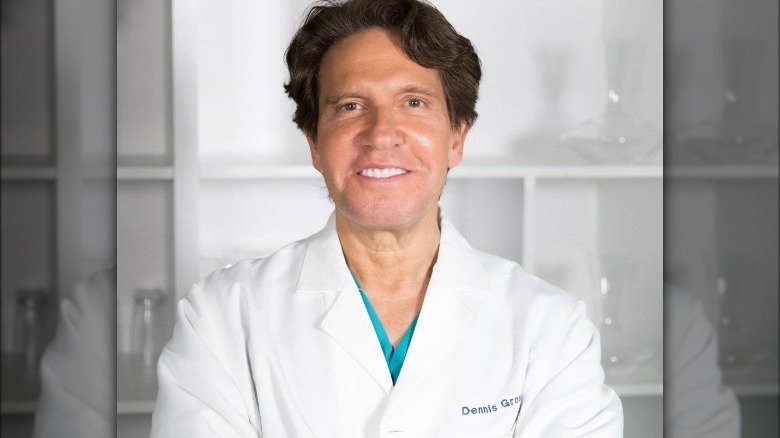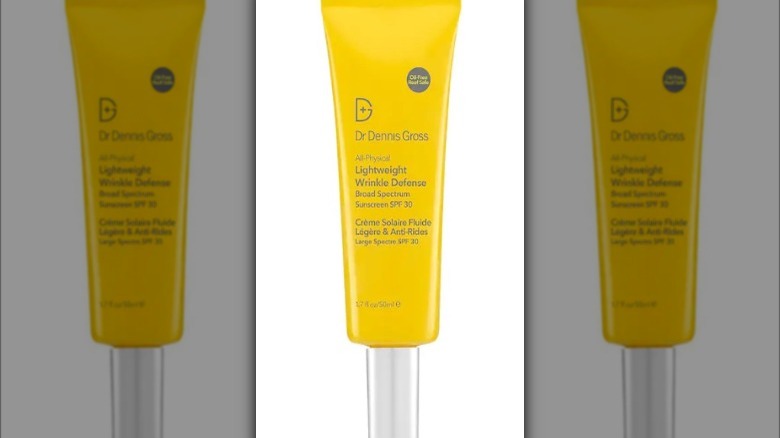Dr. Dennis Gross On Why You Might Be Applying Your Sunscreen Wrong – Exclusive
We may receive a commission on purchases made from links.
There's so much to love about summer, from the longer days and warmer temperatures, and with that comes more time in the sunshine. That's why it's so important to wear sunscreen every day, not that you should skip sunscreen in the cooler months or when you are inside — more sun exposure just means more sun damage. According to the Skin Cancer Foundation, everyone needs to wear sunscreen with broad-spectrum protection to protect skin from UVA (causes aging) and UVB (causes burning) rays every single day, even if it's cloudy. While SPF 15 might be sufficient if you stay indoors more or get minimal sun exposure, you need SPF 30 if you are outside. It's one of the best ways to protect you from skin cancer.
To learn more about sunscreen, we spoke with Dr. Dennis Gross of the award-winning namesake brand Dr. Dennis Gross Skincare on how to properly (and safely) use sunscreen. With his extensive experience as a cancer researcher and a dermatologist, his skincare line focuses on skin health, and it doesn't use over 1,650 ingredients for their "potential toxicity," per Dr. Dennis Gross. He was listed among "one of New York Magazine's Best Doctors for his expertise in skin health," and Elle calls him "One of the most influential sources on the dermatological and beauty worlds" (via Dr. Dennis Gross Dermatology). According to Top Doctors, he is considered among the best dermatologists in NYC. Here he spills the tea on sunscreen.
Dr. Dennis Gross explains how to wear sunscreen correctly to prevent sun damage
While most people know the importance of sunscreen and wear it diligently in the morning, they continue to notice sun damage. That's because there is a proper way to wear it.
Dr. Dennis Gross told The List, "As a dermatologist, I have seen many patients continue to see sun damage despite wearing sunscreen because they aren't applying a sufficient amount, and/or aren't reapplying as frequently as they need to be to protect their skin." He added that you should apply sunscreen "liberally" on your face, neck, and décolletage as every part of your skin can sustain sun damage. "This includes the hairline, ears, and back of the neck. It should also be applied at least 15 minutes before you leave the house, so it has enough time to set," Dr. Gross added.
According to Dr. Gross, another mistake is lack of reapplication. He explained to us, "You are going outside unprotected, and that time does add up. If you are sitting inside all day, applying SPF once in the morning will suffice." However, if you are outside, you can't forget to reapply. Dr. Gross told us, "If you are active, sweating, or come into contact with water, you should reapply afterwards. A common place I find skin cancer is near the hairline on the forehead — this is because people are concerned sunscreen will make their hair greasy." Now you know not to skip sunscreen on all exposed areas.
Dr. Dennis Gross recommends physical sunscreen over chemical ones
Skincare aisles are filled with options of physical and chemical sunscreens, and while they both protect you from sun damage, their main difference is how they protect you from the sun. According to Healthline, physical sunscreens "sit on the surface of your skin and act as a shield" and reflect the UV rays, while chemical sunscreens "absorb UV rays before your skin can soak them up."
According to Dr. Dennis Gross, physical sunscreens are superior. He told The List, "The FDA released a study showing that chemical sunscreen ingredients are absorbed into the bloodstream and that further testing is necessary in order to determine if it's safe. Until this additional testing is done to show that they are safe, I only recommend physical sunscreens to my patients, family, and friends."
Physical sunscreens have a reputation for looking chalky on the skin, which is why people turn to chemical sunscreens as they blend into the skin more easily. Dr. Gross told us of his brand's option, "The All-Physical Lightweight Wrinkle Defense SPF 30 Defense is different from other sunscreens because it's formulated with a superior form of zinc oxide and antioxidant-rich bearberry, sea buckthorn, lingonberry, and ferulic acid. The antioxidants in this formula boost the efficacy of the sunscreen and provide an extra layer of defense against the sun." This transparent zinc oxide is more cosmetically elegant and will never look chalky. It is reef-safe, cruelty-free, and comes in recyclable packaging, making it environmentally friendly.


